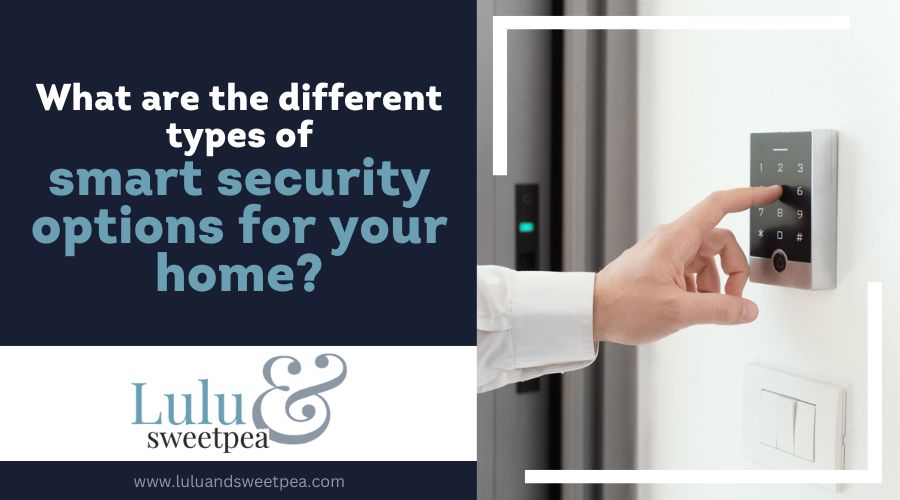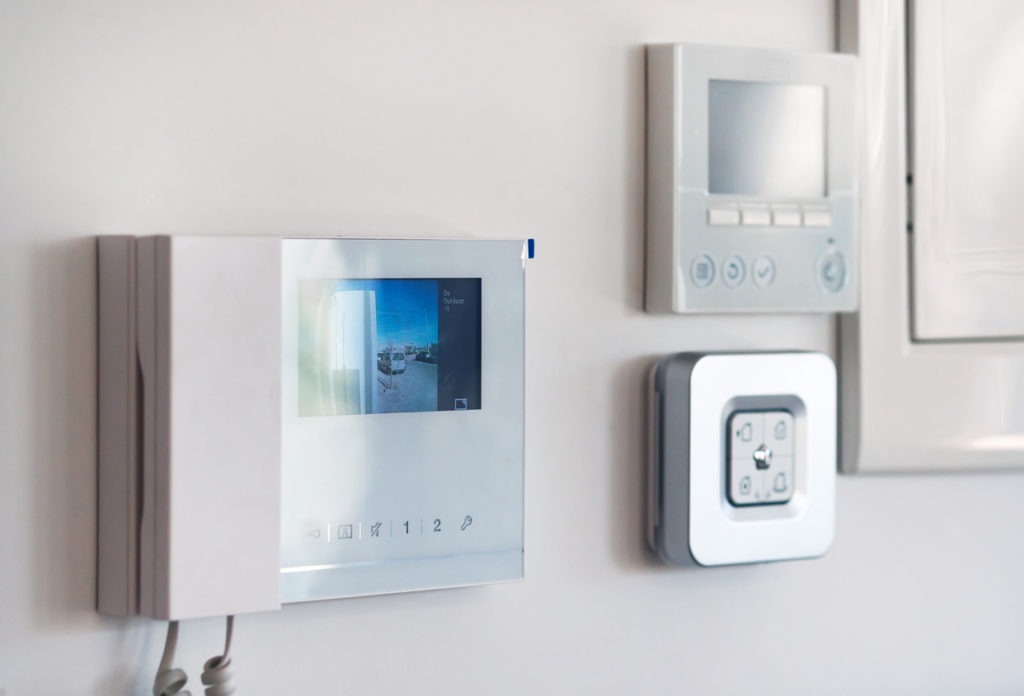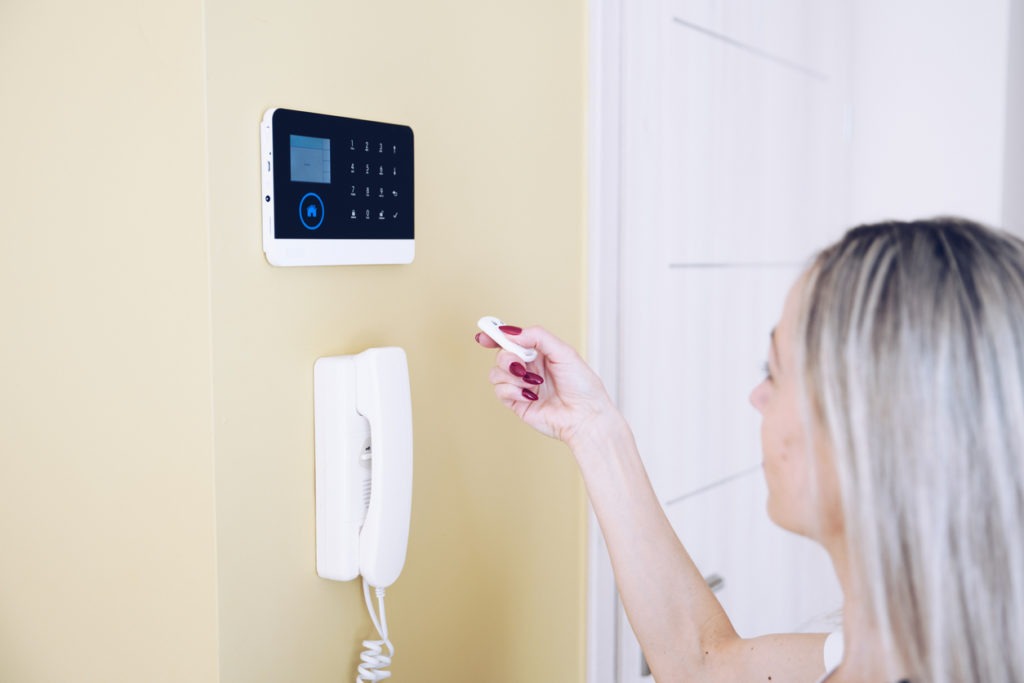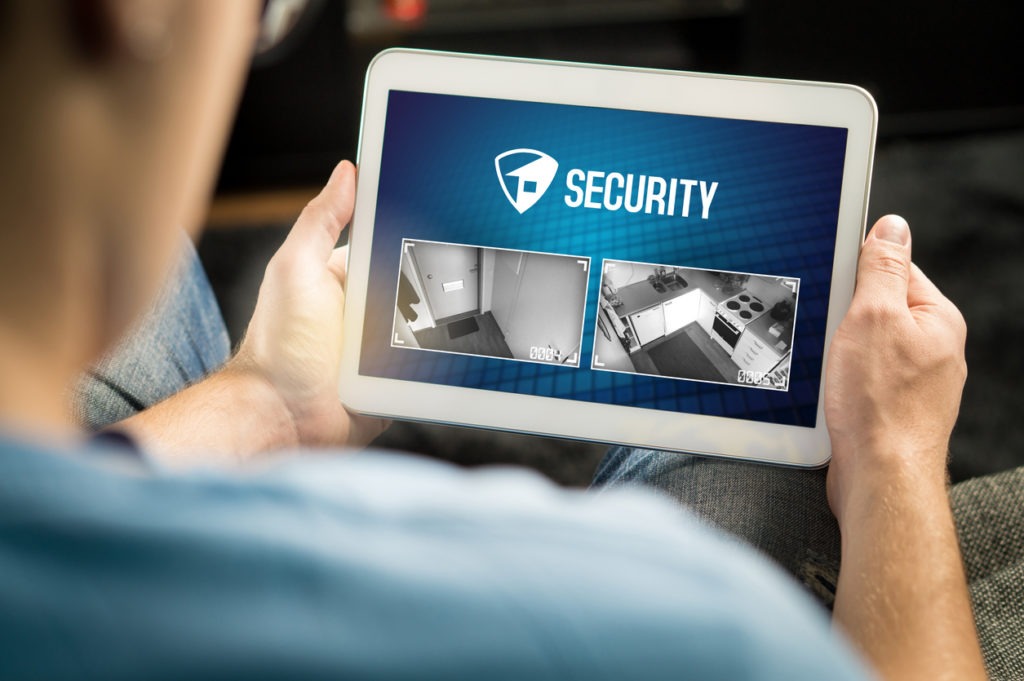You can operate and monitor a number of smart security equipment, including cameras, sensors, and locks, through your smart home. Whether you own or rent, it only takes a few hours to install your own smart home security equipment or you can have more elaborate solution installed by professionals.
What is smart security for your home?
Certain technologies that fall under the broader category of smart home technology safeguard your home and its inhabitants. Popular smart home security gadgets consist of, but are not limited to, the following:
- Door locks
- Window and door sensors
- Interior and exterior lights
- Security cameras (including video doorbells)
- Hub devices
In addition to protecting your property from physical harm, intelligent home security can also contain technologies meant to protect your property from physical harm. Smart smoke detectors and leak and freeze sensors provide early alerts of potential water damage to your property. There is also a growing category of smart home technologies for senior care that can be used to monitor senior folks’ physical and mental health.
Today nearly everyone can take advantage of the benefits that smart home security systems offer — they are safer, more intelligent, quicker, and better. You’ve come to the correct place if you’re looking for a brand-new smart home security system, wanting to get a system installed to compliment your home automation system, or just wondering what smart home security is!
1. Smart Locks
Smart locks are the entry point for most people into smart security technology, and for good reason: they are easy to use and a quick way to enhance your home’s protection with minimal effort.
Many smart locks are compatible with your existing doors and locks, eliminating the need for cumbersome replacements and/or installs. Even yet, we still advise leaving any smart technology installation to the experts, particularly in terms of security.
2. Smart Security Cameras
Additionally, security cameras have evolved to integrate with the smart home environment. They offer features and capabilities that are orders of magnitude superior to those of earlier security cameras. If you are seeking for sophisticated cameras that can record in high definition, differentiate between types of motion and send you alerts accordingly, and also have night vision, then today’s smart security cameras will be exactly what you need.
Moreover, when included into a home automation system, these cameras may be programmed to function with the rest of your smart home.
3. Burglar Alarms
Burglar alarms prevent robbers from breaking into your home and stealing your valuables. Your security system is linked to your doors and windows. If an intruder attempts to enter your home, you and local authorities will be contacted.
Home Security Alarm Functions
Effective burglar alarm systems possess the following characteristics:
- Door and window monitoring: When your door or window unexpectedly opens, you or the local authorities will be notified.
- When activated, an effective motion detection system is sensitive enough to detect someone walking through your home and intelligent enough to differentiate between your pet and an invader.
- Alarm displays. You may leave your windows open in the summer without jeopardizing the safety of your home. If someone breaks through your window screen or attempts to open your window, the alarm will sound and warn you or the local authorities.
Advantages of a Home Intruder Alarm System
There are numerous benefits to installing this type of home alarm. A superior burglar alarm can aid in:
- Studies indicate that criminals will avoid homes with an alarm system. By installing a personalized home alarm system, you can reduce the likelihood of a break-in.
- If you have a burglar alarm system in your home, you may provide your family, guests, and babysitters with peace of mind. They will feel secure in your home knowing that you have taken this additional precaution to prevent a break-in.
- Reduce your insurance cost by installing a burglar alarm can enhance your home’s value and lower your homeowner’s insurance rate. With fewer incidents at your residence as a result of your effective home security system, your insurer will spend less money and may reduce your annual premiums.
4. Alarms for fire and smoke detectors
Fire alarms can protect your family from potential injury by detecting smoke and fire in your home. A fire can cause property damage, and inhaling smoke can be lethal. Install a fire alarm system and take the required safeguards.
Advantages of a Fire Alarm and Smoke Detectors in the Home
Fire alarms and smoke detectors can aid in preventing:
Prevent your home from catching fire: A loud siren will sound if your fire alarm detects any smoke or carbon monoxide in the air. With your fire alarm, you can avoid a fire outbreak and warn your family if your home is in danger.
Protect your home while you are away: Even if you are not at home, your fire alarm will notify the local fire department if there is a fire in your residence. Even if you are not present to take the necessary precautions to prevent a fire, your home will remain secure.
Safeguard any room in the home: While fire alarms should be installed in every room, they can be placed wherever you choose.
Protect your home affordably: Considering the piece of mind and amount of service you receive from a fire alarm; their installation costs are surprisingly low.
Notify you when batteries must be replaced: The fire alarm should be inspected every six months and updated every ten years. If your fire alarm begins to chirp without a fire present, you may also need to replace the batteries
5. Wireless Alarm Kits
With the emergence of smart technology, alarm systems have become a significant benefit for homeowners. Smart alarm kits include a smart hub that connects to your Wi-Fi and then links the rest of the kit’s gadgets. In addition, they have motion sensors that may be discreetly put in your home, a door sensor, a keypad control that arms and disarms the alarm using a PIN code, and an outdoor siren box. If you have a larger home, a kit is especially useful because the lights can be placed wherever and are totally controlled by an iPhone or other smartphone.
What to think about before buying smart security products for your home?
Step 1: Think about how big your house or apartment is.
Think about the size of your home or apartment before you buy any smart home products. Depending on the size of your home, you’ll need a certain number of security products if you want to make sure your home is safe.
For instance, if you live in a studio apartment with only one level, you probably don’t need more than one indoor security camera. One smart security camera that can do many things may be able to watch your apartment for possible dangers.
Step 2: Count the number of entrances to your home, including windows.
Every way in or out of your house could be a weak spot. One study of 86 real burglars found that most of them got in through a front door or window that wasn’t locked.
Aside from the front door, windows, back doors, side doors, garage doors, and even pet doors can make it easy for someone to get into your home.
Make sure you know how many of your home’s entrances could pose a security risk. That should include the front, back, and side doors, the entrances to the basement, and the windows on the first floor. Second-floor windows are less of a concern unless they are easy to get to because of how your house is built or what’s around it (such as trees).
Step 3: Figure out how fast your internet is or how much bandwidth you have.
Some smart home security devices need a lot of data. Even one video camera that records HD video continuously will use between 1.5 and 2 Mbps of downstream internet bandwidth. Other smart home security products will use a lot less power, but you should think about all of this before you set up your smart home.
Importantly, you probably already have multiple devices in your home that slow down the bandwidth you have. The most common things that use a lot of data are streaming TV or music and playing video games online.
Step 4: Make sure you have mobile devices that can work with most smart security products.
Before you buy any smart home security products, make sure that the apps that work with them work with not only your version of iOS or Android, but also your device.
Users of Apple products rarely have problems because their devices don’t do as much as users of Android devices sometimes do. Even if your Android phone or tablet has a version of Android that the smart home product works with, there may still be limitations based on the Android phone or tablet you’re using. If the device has limitations, the company that sells it may know about them and have some information about them on its website knowledgebase.
Step 5: Choose the type of intelligent home security products you desire or require.
Even though the quantity of available devices may appear daunting, there are just a few major categories to consider when getting started. Before purchasing any item, determine whether you desire or need it.
One or more intelligent (indoor and/or outdoor) security cameras.
- Multiple smart locks
- Window or door break sensors
- Innovative outdoor lighting
- Motion sensors
- A video doorbell
- A home automation hub device
- A manipulator/keyboard
This is the most important step in the process, so you should take the time to learn about the most common smart home security product types and what you should consider before making a purchase.
The Drawbacks of Smart Security
1. Probability of being hacked
Someone will always find a way in, especially if you rely solely on intelligent security. Remember how we discussed the weakest link in the chain as an entry point into your system? Well, IoT devices are far from flawless, and there are methods for breaching the security wall and gaining access.
Once attackers have access to your smart devices, they can continue to launch attacks anytime they like.
2. Power loss
It would be catastrophic if your entire security system depended on a constant and dependable electrical source. How would technology respond if the power were to fail? Exists a backup battery for your lock, and if so, how long does it last?
These are all genuine concerns that should alert you to the fact that the Internet of Things is not a panacea for all your security issues.
3. Losing your mobile device
These days, we keep everything on our mobile phones, including images, contacts, passwords, and even home security system controls. If you lose or have your phone stolen, you are susceptible to security breaches. Even a mugging could be a trigger for a bigger crime.
4. Virtual crimes
Imagine being robbed from the outside of your home. Without any effort, hackers might access your gadgets and take the contents of your bank account.
Wearable and Transportable Devices
Smartwatches, mobile phones, and fitness devices are the only devices that reveal your whereabouts. Hackers may easily determine your location and know that when you answer your video doorbell pretending to be home, you are actually thousands of miles away.
5. Observing You, Observing Me
Who would know if someone who gained access to your security system turned the tables and used your cameras and doorbells to spy on you? They might monitor your every move without your knowledge.
The Benefits of Smart Security
There are various benefits to utilizing an intelligent security system. These consist of:
1. Convenience
What could be better than configuring your security cameras from your sun lounger while on vacation? It also means that checking in poses no difficulty. You can receive updates and rest assured that all is well at home.
2. Great deterrents
Smart security can create the illusion that you are home to deter burglars. Imagine the scene: The video doorbell rings in the middle of the night, and an alert displays the face of the visitor. You inform them that you will not be at the door and respectfully request that they contact you during daytime hours. To further emphasize that you are at home, you use your smart-hub to illuminate your bedroom. This should be sufficient to deter any would-be intruders.
3. Command 24/7 everywhere
Imagine being able to turn on your lights or close your draperies by pressing a button on your cell phone from across the globe. You may even program the radio to play to further the illusion that you are at home.
4. Clean up mistakes
Perhaps you failed to set the garage door’s lock before jetting off to warmer climes and have only just realized your blunder. With remote control, you may engage the lock without worrying that you may have been the victim of a crime during your entire vacation.
In conclusion
Intelligent security systems simplify the process of protecting your property from intruders. With their unique capabilities, you may monitor live updates on your mobile device. If you are frequently away from home owing to work, you can monitor your home while you are at the office. In the past, smart security was relatively expensive, but as the technology has advanced, the smartest security gadgets and kits now cost cheaper. Therefore, even people on a tight budget can defend their houses and rest easy.



